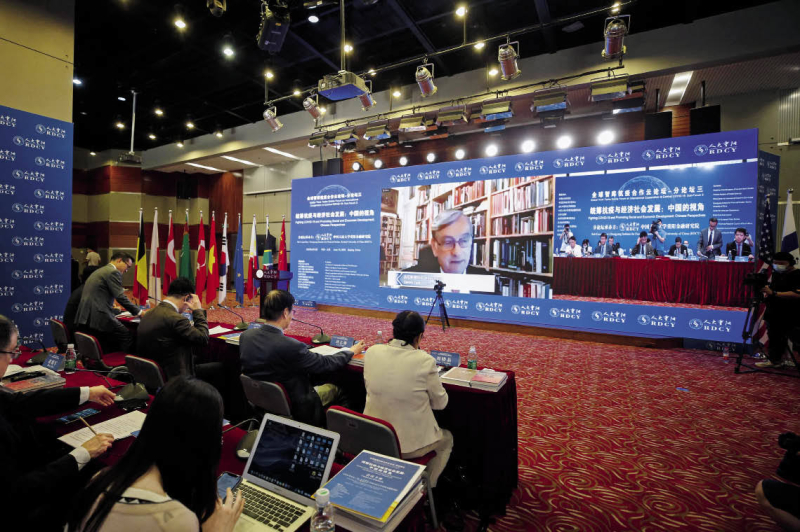Post-COVID-19 global economy calls for responsibility
- By Thomas S. Axworthy
 0 Comment(s)
0 Comment(s) Print
Print E-mail China Today, July 26, 2020
E-mail China Today, July 26, 2020

The World Bank says the world has changed as a result of the COVID-19 pandemic, and who could disagree? The bank's June 2020 Global Economic Prospects Report described how the world is enduring the deepest recession in decades with no clear end in sight, except perhaps in China. The Organization for Economic Co-operation and Development (OECD) shares the similarly gloomy view in its June 2020 Economic Outlook. It forecasts that global economic growth will fall by 6 percent in 2020 with unemployment at over 9 percent, and if a second wave of COVID-19 hits, the results will be even worse with European GDP growth in 2020 projected to fall by 11.5 percent, in the United States by 8.5 percent, Russia by 10 percent, Brazil by 9.1 percent, India by 7.3 percent, and China by 3.7 percent. Given these uncertainties, China has prudently not set a growth goal for 2020.
No one knows if there will be recurring attacks of the coronavirus, but the current situation is bad enough: As of July 2020, there had been over 12 million reported cases, over half a million deaths, losses of 305 million full-time jobs, and fears that 1.6 billion workers in the informal economy could suffer "massive damage" to their livelihoods, according to the UN's International Labor Organization.
The economic impact of COVID-19 is not likely to be a short-term blip. The World Bank report says, "Over the longer horizon, the deep recessions triggered by the pandemic are expected to leave lasting scars through lower investment, an erosion of human capital through lost work and schooling, and fragmentation of global trade and supply linkages." A July 2020 McKinsey briefing confirms the concerns of the World Bank: McKinsey found, in a global survey of those who make household financial decisions, that they are reporting lower income, savings, and spending with 20 to 60 percent of the decision-makers fearing for their own jobs. Roughly half of those surveyed had no more than four months of savings. As McKinsey concludes, "The COVID-19 pandemic has left no one untouched."
Governments have not been idle in their responses to the crisis. Most governments were quick to provide emergency lifelines to protect citizens financially as employment levels fell. In May 2020, the International Monetary Fund estimated that global fiscal support stood at US $9 trillion in direct support of individuals, emergency corporate loans, etc. As one commentator said, "Protecting an economy from a pandemic isn't cheap." In rich nations, the IMF forecasts that the ratio of net debt to GDP will shoot up to 94 percent in 2020, compared to 77 percent before the pandemic. As measured by surveys, there was widespread public support for governments to spend, to prevent countries from tumbling from a COVID-19 recession to a COVID-19 depression. However, the question remains: can governments continue to support millions of workers indefinitely as tax revenues fall?
Not only are our economic futures at stake as the world tries to climb out of the COVID-19 crisis black hole, so too are our values and the responsibilities we owe to one another. The InterAction Council is well known for its Universal Declaration of Human Responsibilities, and COVID-19 has tragically brought the concept of responsibility to the fore. What are the responsibilities of states to inform others if their citizens are hit by a virus, what are the responsibilities of international agencies in coordinating actions to prevent and/or respond to such outbreaks, what are the responsibilities of national governments to protect their citizens and what are the responsibilities of individual citizens to do their best not to spread the disease to others? That such a simple thing as asking citizens to wear a mask could become a major political/cultural divide issue in the United States demonstrates that there is much to do in promoting the centrality of responsibility.
There is little good that can come out of the tragedy of a pandemic, but if there is even a hint of a silver lining, it is that we have come to value what is truly essential in our societies. When the pandemic hit with such force and families worried about whether or not the food distribution system would break down, it was low paid cashiers, stock workers, and cleaners who kept the stores open. Medical staff, store employees, truckers, and farmers were essential, not hedge fund managers. As we emerge from the COVID-19 black hole, this must not be forgotten.
The less well-off have suffered the brunt of COVID-19's ravages both in deaths and in economic hardship. They must be first in line when the post-COVID-19 world looks to benefits and rewards. Like other countries, China's economy has been greatly impacted by the pandemic, but this year China reaffirmed the goal of lifting all rural poor people out of poverty. Given COVID-19, there are many reasons why poverty elimination could have been postponed, but it is reassuring that poverty reduction is still high on the agenda of Chinese decision makers. This example should inspire other countries to do likewise.
We are in for the long haul economically. Obstacles to any progress will also multiply exponentially if a second wave of COVID-19 hits our societies. But in coping with the disease itself and the economic and social impacts it creates, our moral guide must be the old saying to "do unto others as you would have them do unto you."
Thomas S. Axworthy is the secretary-general of the InterAction Council.





